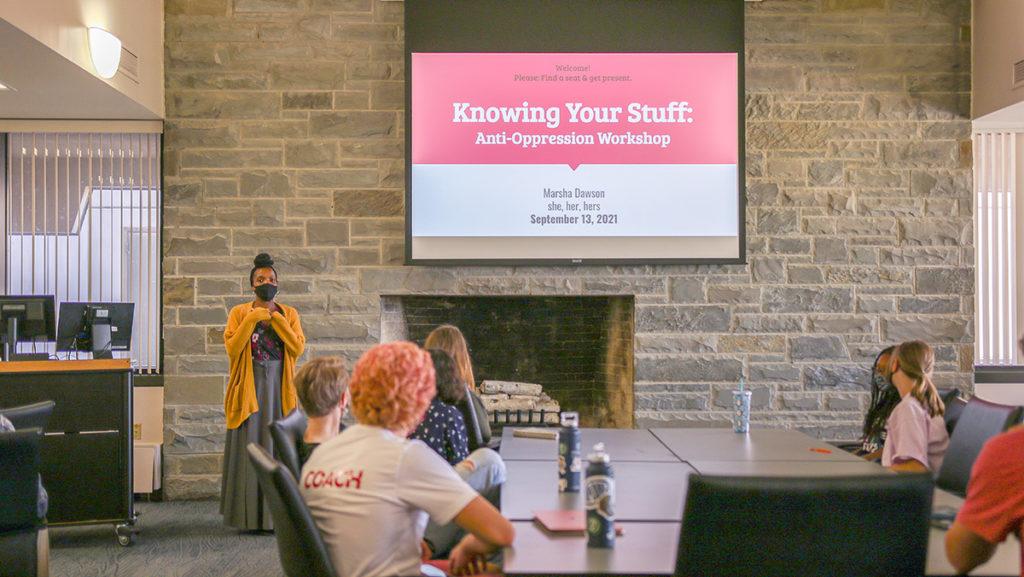Ithaca College students had the opportunity to learn more about power dynamics between groups of people and injustice at an anti-oppression event Sept. 13.
Approximately 20 people attended the event,“Knowing Your Stuff: Anti-Oppression Workshop (Leading in a Diverse World),” that was led by Marsha Dawson, director of the Office of Residential Life and the Office of Student Conduct and Community Standards. The event allowed students the opportunity to work with each other and learn more about oppression. Dawson said a second presentation focused on microaggressions will happen in the coming weeks.
Dawson said the point of the event was to bring more awareness to understanding oppression and how different systems of oppression work in society and on campus.
“Really getting real and honest about what are the shortcomings of where we reside, where we work and figuring out ways to make that better,” she said.
Dawson said the college is a business and it reflects injustice and power dynamics seen in society.
One student said they think learning is a lifelong process.
“Your journey in learning is never over,” the student said. “It’s important in my role as a student to continue to always educate myself so when I walk into a space I’m coming in and putting my best foot forward but knowing that’s not where it ends.”
Dawson said she wants students to understand power and oppression and asked students to write down their own definitions for the words power, privilege, intersectionality, equality and equity.
Dawson defined oppression as “the combination of discrimination and power creates a system that discriminates against some groups and benefits other groups.” She said oppression also manifests on institutional, intercultural and interpersonal levels. Dawson also listed different types of oppression like race and ethnicity, disability, sexism, sexual orientation and religion.
“The work that we’re trying to do is understanding these different forms of oppression and uprooting oppressive behavior,” she said.
Dawson then asked students to talk about some of the forms of institutional oppression they have seen, specifically ableism. Some of the students brought up ideas surrounding students in wheelchairs and how people may ask them if they can walk or not. One student brought up how the campus is located on a hill, making some buildings difficult to access for people who have difficulty walking. Another student said that elevators on campus are located in areas that are sometimes difficult to access.
She said while money is always a consideration when looking for solutions to oppressive problems — like the campus’s inaccessibility — it should not stand in the way of making sure that change is enacted. One student said that the campus being difficult to navigate for disabled students should not be the reason someone decides not to attend the college.
Other students said the elevators in the James J. Whalen Center for Music and Campus Center are difficult to find, while others said they did not know the elevators existed.
Freshman Libi Warmund said they decided to come to the event because they thought the topic was interesting and something they wanted to learn more about.
“I’m trying to work on effecting change and I think that this is the first step,” they said.
Warmund said they liked that some of the conversation centered on ableism, because ableism is not often discussed.
“It gave me more insight into how other people experience living on campus and how it’s different than I experience it,” Warmund said.
Junior Holden Shatouhy said he thought it was interesting to hear more about accessibility issues on campus.
“All the elevators are really well hidden and if you’re in a wheelchair, there’s no way you’re making it up these hills,” Shatouhy said. “How would you get to Towers?”
Shatouhy said he attended the event because he is a Leadership Scholar, but also because he had a genuine interest in learning more about power and oppression.
“Acknowledging these issues like racism, inequality, inequity that still exist on our campus, despite the fact that this school always tries to cover it up by using minorities in all of their photos,” he said. “This school always takes a moment to highlight how diverse they are, and then you walk on campus and you don’t see any of that anywhere.”









